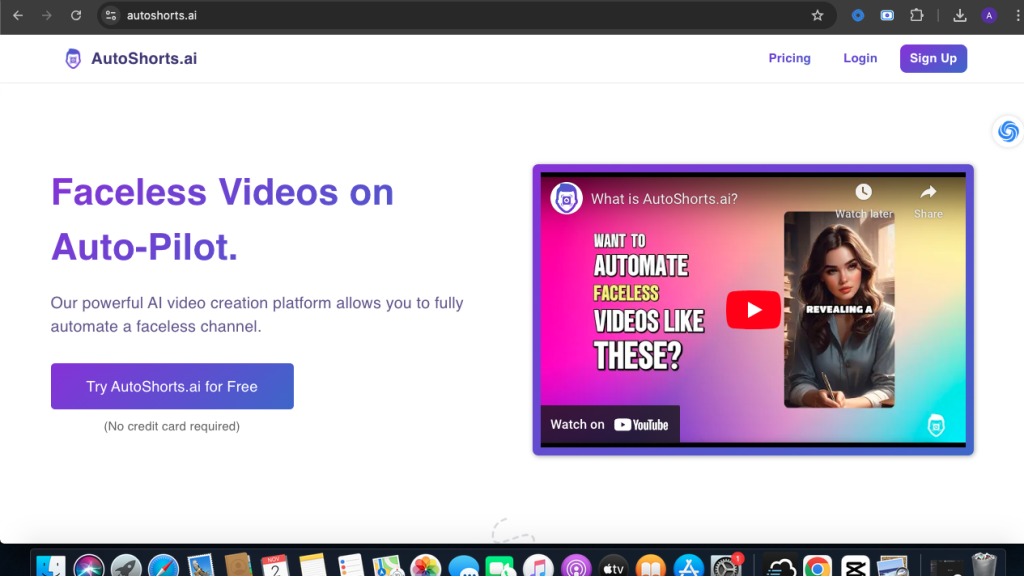Creating a faceless YouTube channel was never my initial intention when I first began my journey as a YouTuber several years ago. As someone who’s rather shy, the idea of putting myself out there and being the face of my channel was intimidating. However, I was passionate about the topics I wanted to discuss and knew video was the perfect medium to do so.

10 Google Search Console Tricks That Will Transform Your SEO in 2024.
What I did next
Well, after much deliberation, I decided to take a rather unconventional approach – I would create a faceless YouTube channel where viewers knew me only through my voice and words, without seeing my actual face. At first it felt a bit strange, like I was hiding behind some veil of anonymity. But the deeper I went down this path, the more freedom and possibilities I discovered.
The Challenge of Consistency
Running a faceless channel allowed me to stay true to my authentic self without fear of judgment for my looks or personality. I was able to connect with audiences on a deeper level through meaningful discussions alone, unobstructed by superficial factors. It truly became about the ideas, information and value I shared, rather than any superficial qualities.
Of course, one big challenge quickly emerged and that was how to produce such high-quality, comprehensive videos on a consistent schedule without burning out. I was a solo creator with a day job, so time was scarce. Uploading just one video per week was draining as I handled all steps manually from writing to filming and editing.
Finding the Solution to the Challenge of Inconsistency.
SO, keeping viewers engaged with new material at a reasonable cadence grew increasingly difficult. And something had to change or my channel would stagnate. But what was the solution that respected my desire for anonymity while allowing me to scale efficiently?
That’s when I explored even more and discovered AutoShorts.ai and my entire approach shifted. This ingenious AI platform automated every aspect of the production process using machine learning, freeing up my energy to instead focus on strategic Growth. Note: Autoshorts.ai is a paid software. To learn how to Create Faceless YouTube Videos Free of pay, Check out Digi-Flair Techversity or contact Arinze HBC for Guide/Tutorials.

Creating Without Compromise Using AutoShorts.
To set up AutoShorts, I started by outlining my channel’s overall goals and themes. This provided valuable context for the AI to craft videos accurately aligned with my brand’s voice and audience needs.
I then began experimenting with AutoShorts’ different generation options. For some videos, I’d write a basic script and let the platform refine the transcript, add transitions, score clips, and finalize production elements like titles automatically.
In other cases, I’d simply provide a topic or question and allow AutoShorts’ deep neural nets to research the subject extensively before writing, voicing and assembling a video from scratch according to my preferences.
No matter the approach, the end results were incredibly polished works save me hours of tedious manual effort. Yet somehow, AutoShorts tailors each video specifically for my viewers in a way no generic automation could achieve. This ensures valuable, authentic content tailored to me and my community.
The Advantage
Taking the guesswork out of flow and cadence, I now upload two new videos daily without lifting a finger beyond initial planning. Consistency that would otherwise require a team is now within my sole control – talk about empowering!
I won, now i’m focusing on What Truly Matters
Freeing myself from the shackles of production minutiae has opened up a new level of strategic thinking for my channel. No longer reacting to problems in isolation, I can now take a “bird’s eye view” to establish long-term brand visions.
With endless time gifted back each day, I’ve truly understood my audience through deep analytics reviews. This enlightenment guides intentional messaging focused on their core pain points rather than fleeting trends.
Growth Through Experimentation
Reaching out personally on social networks comes naturally too, forging real connections that spread word of my channel organically instead of chasing short-term promotional gains. It’s a sustainable approach rooted in genuine care, not superficial metrics.
Even my self-confidence has multiplied tenfold to take bigger creative risks. Knowing consistent output remains guaranteed by AutoShorts frees my mind from fears of failure or experimentation. This progress mindset ignites new viewership heights with each innovation.
Embracing Enabling Technology
When I reflect on my journey so far, one truth remains abundantly clear – learning to embrace enabling technologies like AutoShorts.ai is important for any serious content creator in 2024 and beyond.
Focusing solely on manual production amid this digital renaissance represents an obsolete mindset holding one back from real growth potential. Leveraging smart tools multiplies our capacities in astounding ways too significant to ignore.
My Untapped Potential with AutoShorts

I’m proof that with AutoShorts, anonymity and automation can synergize beautifully to unlock untapped freedoms, connections and success far beyond what any lone effort possibly achieves. Now the only boundaries are my own imagination and willingness to keep exploring possibilities.
If maintaining privacy through a faceless approach appeals while scaling professionally, I wholeheartedly recommend experimenting with AutoShorts.ai. The results will leave you inspired by your own limitless potential to impart meaningful change through quality videos on auto-pilot. Feel free to ask me anything – I’d love to share more.
Here are some additional areas I think are worth exploring: content strategy, audience engagement tactics, and monetisation opportunities. Proper planning and continuous testing are so important for long-term channel growth. While automation handles the production, we must focus on creative ways to nurture real relationships with viewers.
In terms of strategy, I’d recommend experimenting with different types of videos like tutorials, interviews, reviews and more. See what resonates and use data to optimize. Holidays or seasonal topics can trigger viewer nostalgia too.
Some engagement tips include commentary tracks, Q&As, replying to every comment if possible. Beyond YouTube, be active on socials and forums that your viewers frequent. Visual extras like graphics or playlists supplement the content well too.
Monetisation Opportunities for Channels
Monetisation is another avenue to investigate over time. While ads run automatically, look into affiliate marketing, sponsored content, memberships or paid online courses related to your niche. Patrons, channel memberships and merchandise also support superfans financially.
Overall, the goal is providing maximum value consistently in a way true to your brand voice. AutoShorts help massively but we must still apply human creativity and care. It’s a partnership between man and machine for truly special results. Does any of this help as you launch your channel journey? I’m always here for suggestions and to support!
How to Start Amazon Affiliate Marketing in 2024: A Step-by-Step Guide

Conclusion
I hope my insights have provided plenty of useful ideas as you embark on establishing your faceless YouTube channel and with the aid of AutoShorts.ai. While the future remains unwritten, I’m confident that leveraging the power of both autonomy and community will lead you on an exciting path of learning, growth and positive impact.
Remember that consistency, quality and genuine connection and passion for your topic are the ultimate drivers of sustainable success online. With AutoShorts automating the technical aspects, it frees your mind to focus on strategic creativity, care for others and continuous evolution.
This symbiosis of man and machine truly represents a new chapter of opportunity for content creators. Though the work is not easy, the rewards of empowering lives through education and inspiration make it all worthwhile. I wish you the very best in your journey and encourage you to keep experimenting, tracking progress closely and having fun along the way.
My door is always open if you have additional questions down the road. Stay curious, work hard and spread your message – I can’t wait to see where you go from here! Onward to positive change through your channel as you start now!
Related Topics:
10 Google Search Console Tricks That Will Transform Your SEO in 2024.
How to Start Amazon Affiliate Marketing in 2024: A Step-by-Step Guide

